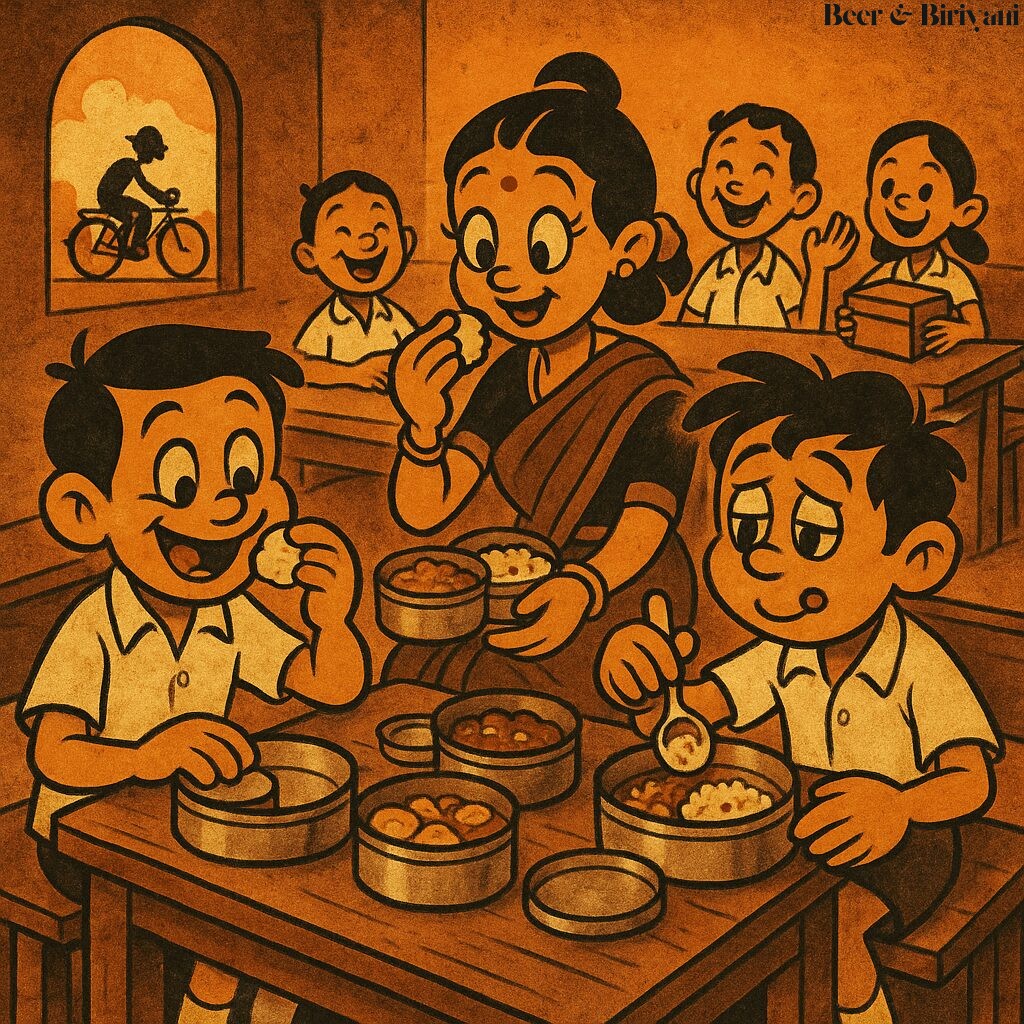In every Indian household, there exists a minor culinary miracle: the tiffin that always came back empty. Not because the food was fancy, or because the portions were huge, but because it was food made with precision, packed with care, and devoured with quiet joy somewhere far from home.
As a kid growing up in Mumbai, my lunch was never a surprise. It didn’t need to be. My mother believed in rhythm, not reinvention. Monday meant aloo sabzi, Tuesday was varan bhaat, Wednesday flirted with bhindi. I knew the menu before I opened the lid. But still, the moment I cracked open that three-tiered, stainless steel tower in the school lunchroom, it felt like unwrapping a love letter written in cumin and ghee.
The Geometry of Lunch
The Indian tiffin is not a box. It is a system. Circular, stackable, sealed with a metal clasp that required both technique and thumb strength. Three compartments, sometimes four. Rice at the base, sabzi in the middle, and something with sauce or surprise on top—like batata rassa or moong dal spiked with mustard seeds. If you were lucky, one tiny box was dedicated to pickle or a soft sweet—just enough to remind you of home, without making your classmates jealous.
It didn’t matter if the food was lukewarm. It didn’t matter if the chapatis curled slightly at the edges. The tiffin didn’t promise hot food. It promised familiar food. Food that tasted the same on the 40th floor of your office building as it did in your mother’s kitchen.
The Dabbawala Ballet
In Mumbai, the tiffin wasn’t just about food. It was a logistics masterpiece. Thousands of dabbawalas crisscrossed the city daily, ferrying lunch from homes to offices with color-coded symbols and zero tech. Harvard studied them. We just waited for them. Every day at 12:45, tiffins would arrive like clockwork—stacked, steaming, and smelling like a sigh of relief. My father swore that food tasted better when delivered by dabbawala. Maybe it was the anticipation. Maybe it was the sheer triumph of the system.
What You Pack Says Who You Are
The tiffin also revealed secrets. You could tell where someone was from just by the smell. Sambar and podi? Tamilian. Jeera rice and rajma? North Indian. A different pickle every day? Gujarati. The lucky kids had mothers who experimented. The rest of us had mothers who were consistent. And honestly, there’s comfort in knowing that Tuesday always brings lauki and not existential dread.
Some kids traded. Some hoarded. Some finished lunch in class and acted surprised when the bell rang. But almost all of us returned our tiffins empty. Not because we were starved. Because it was food we couldn’t not finish. Food that felt like a thread back to something anchoring.
The Silence of the Return
What no one talks about is the reverse ritual—the washing. Every evening, the tiffin would be opened again, this time under the kitchen tap. My mother would inspect each section like a detective. “Did you eat the spinach?” “Where’s the chutney spoon?” “Why didn’t you finish the rice?” Some questions had answers. Others just ended with “Next time, eat properly.”
Even the emptiness of the tiffin spoke volumes. It said: the food reached. It mattered. It was enough. That silence between sender and receiver, bridged by dal and steel, was its own kind of communication.
The Tiffin Abroad
In Austin, I still carry a tiffin to work. Not every day. But enough to feel tethered. Mine’s a modern one—BPA-free, leak-proof, slightly too proud of itself. But the feeling remains. I pack leftovers. I portion like my mother did. I carry a tiny dabba of pickle that I guard like gold. When I open it at lunch, even in a breakroom full of quinoa salads and oat bars, my tuvar dal smells like home. Some people ask what it is. I just say, “Lunch.” The real answer would take longer than an hour to explain.
The Archive of an Empty Box
We save photos. We hoard keepsakes. But the tiffin? It doesn’t collect dust. It gets used. Scratched. Overwashed. It carries smell more than memory. But if you pay attention, it tells you everything. About who packed it. About where you came from. About what filled your day, and what filled your stomach.
So yes, the tiffin always came back empty. But only because it did exactly what it was meant to do—carry food across time and space, and return, quietly victorious, ready to do it again tomorrow.
Born in Mumbai, now stir-frying feelings in Texas. Writes about food, memory, and the messy magic in between — mostly to stay hungry, sometimes just to stay sane.












